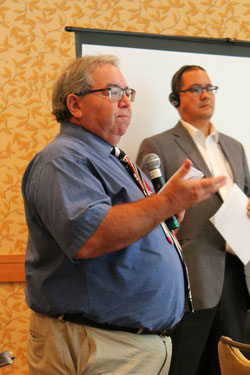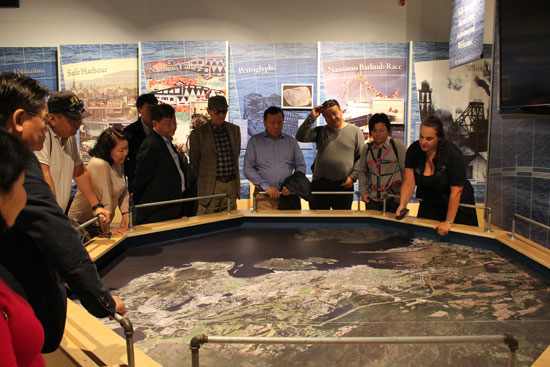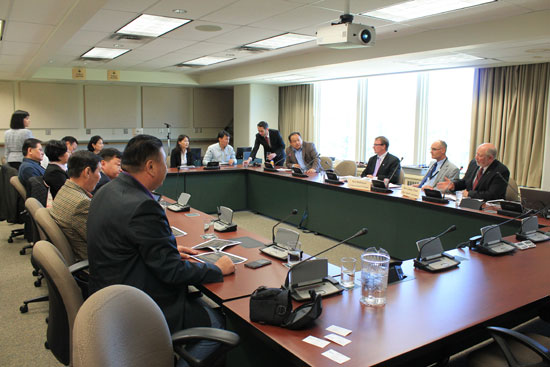
Sharing Lessons on Mining Governance: Q&A With Hon. S. Odontuya of Mongolia's State Great Hural
A study tour in September brought six Mongolian members of parliament (MPs) and three parliamentary staff members to western Canada, where they met with tax and public finance officials from British Columbia and Alberta, provincial and federal legislators, leaders of Canada’s First Nations (indigenous communities), and representatives from industry who work with mining-affected communities. The exchange yielded important lessons on resource governance for Mongolia’s policy-makers, who are currently tasked with regulating a valuable and volatile mining sector.
In the interview that follows, Dorjdari Namkhaijantsan—NRGI’s Mongolia country coordinator—spoke with the Hon. S. Odontuya of the State Great Hural, or parliament, about her takeaways.

The Hon. S. Odontuya of Mongolia (Photo: Neil Gaudet)
NRGI: Mining is intensifying in Mongolia. How can the country benefit from this development, and what challenges will it face?
S. Odontuya: Over the past eight to nine years, I think Mongolia has gone through similar experiences as others. There have been mistakes, but also successes. Now we are entering the second stage of mineral development, a real mining “boom.” At this stage, we should not make mistakes. It is really important for us to gather information on how other countries went through similar processes to improve their legal frameworks so that we can improve our reforms.
“As members of parliament, we need to understand clearly the choices that other countries have made in order to minimize mistakes.”
So mistakes would be costly. As members of parliament, what concrete issues do you think the State Great Hural should concentrate on to address these potential challenges?
As members of parliament, we need to understand clearly the choices that other countries have made in order to minimize mistakes. This is the challenge of promoting sustainable development of the sector. In our own experience, at times our policies were too lax, including licensing and oversight, and, at other times, all things were prohibited. This obviously creates instability. Other countries have succeeded by creating stable processes where government, investor and citizen interests are equitably reflected in the policies.
NRGI works to improve the governance of the oil, gas and mineral sectors in different countries by proposing effective rules and mechanisms for accountability and transparency, and supporting the implementation of those rules and mechanisms. How can organizations like NRGI help parliaments implement and oversee their policy work?
I mentioned that we made some mistakes. The main mistake was that we created an unstable environment in this sector. The instability in this sector was created because parliamentarians would initiate various laws related to elections, and often these initiated laws are not based on recommendations of research and policy institutions. The key significance for us to work with NRGI is to learn from others’ experiences—drawing on research and independent assessment of others’ policies—so that we avoid creating further instability. In Mongolia, we recently approved a new petroleum law and revised the minerals law, as well as the state policy for minerals sector for the next 10 years. In doing so, it is essential to learn from other countries’ experiences, and receive evidence based on recommendations from research and policy institutions.

The Hon. S. Odontuya (left) and NRGI’s Dorjdari Namkhaijantsan (Photo: Andrew Bauer)
This study tour was very timely. When a challenge is far ahead, people do not pay much attention. But the challenge for us is right in front of us, as the whole world is observing our next steps in terms of issuing regulations to the approved laws and implementing these laws. At this crucial stage, it was very important that key decision-making parliament members from different political parties joined this study tour, including a chairman of one of the standing committees.
In Canada, you have studied how provincial governments collect their minerals and petroleum revenue, and how governments and companies communicate with local communities. You have also studied tax and fiscal environments. What did you learn from the experiences and policies implemented by Alberta and British Columbia? What policies could you emulate and implement in Mongolia?

Chief David Walkem, chief of Cooks Ferry Band in the province of British Columbia, explains how his First Nations community manages its relationship with mining companies Teck Resources and New Gold. (Photo: Andrew Bauer)
This study tour helped us validate our own development concept and determine whether we are on the right track. For instance, the issue of state participation in the sector is highly debated in Mongolia. We have been asking in detail about the role of state participation [equity shares] in the successful development of these two provinces in Canada. The state should perform its main functions effectively. The policies here are directed at supporting sustainable tax payers. This is proof that the policy should be directed at collecting taxes from profitable businesses and not for the state to go after the profits and do business on its own. This was very significant.
The second issue is that protecting interest of companies and investors is not sufficient, and that the protection of rights of citizens should be equitably reflected in the policies. In this direction Canada is implementing some best practices, especially with regard to the First Nations issues, transparency of the extractives, and saving and adding value to the minerals revenues, and using these revenues for the society’s benefit.
As we have observed, the role of political leadership is very important.
While we cannot learn everything during a short time period, we have established contacts with important people, received information of important websites and other sources of information, and learned about the laws that exist in Canada. This will certainly aid our near future work in Mongolia to improve our legal environment. I would like to thank you on behalf of all MPs.
Thank you.

The Mongolian delegation learns about British Columbia's history of managing coal mining booms and busts at the Nanaimo Museum. (Photo: Andrew Bauer)

The Mongolian delegation meets with Ron Casey--chair of the Standing Committee on the Alberta Savings Trust Fund--and officials from the Alberta Ministry of Finance. (Photo: Andrew Bauer)
This is the second of two interviews conducted during the September study tour. In the first, current sitting MP for the opposition Mongolian People's Party (MPP), Mr. Yondon Otgonbayar, speaks with NRGI's Andrew Bauer, and additional background is given on the extractive sector challenges that Mongolia currently faces.
Since returning from their study tour to Western Canada, Mongolia's parliamentarians have begun drafting new and improved policies in support of good governance of mining sector revenues, but not without debate. Read more »